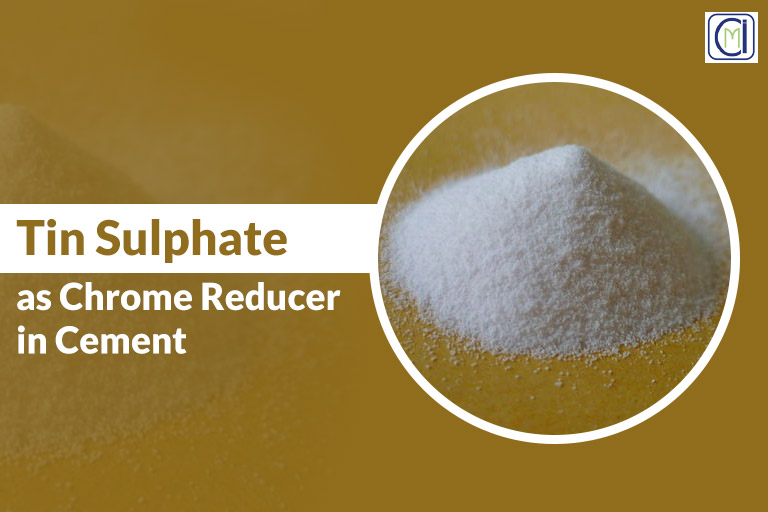
Tin Sulphate as Chrome Reducer in Cement
What is Tin Sulphate?
Tin sulphate is a chemical compound with the chemical formula SnSO4. It exists in solid form in white color. It is known for its deliquescence property, where the solid absorbs moisture and forms an aqueous solution.
Why Do We Need A Chrome Reducer In Cement?
Chromium is used as a raw material in the production of cement. The natural Chromium is chemically stable and raises no issue. However, it becomes harmful when heated. After entering the rotary kiln in the production process, it is subjected to high temperatures. The trivalent Chromium, which is present in the inert form, undergoes oxidation to give hexavalent Chromium, which is chemically reactive. It poses a threat to human health when dissolved in water. Our skin can develop a medical condition called Chromium Dermatitis. Such conditions have been widely reported among construction workers. This is why the use of Chromium is limited in cement production. Chrome reducers are added to the cement to limit the active chromium content.
Use of Tin Sulphate in Cement
Reducing agents are added to the cement production process to adhere to government directives. These reducing agents convert the hexavalent Chromium into trivalent Chromium. Tin Sulphate or SnSO4 is used as a Chrome reducer in cement production. The Sulphate in it changes the setting time and strength of the cement. The addition of Tin Sulphate to the cement mixer gives (Sn6O4(OH)4) and CaSn(OH)4. The concentration of the Tin Sulphate also matters. SnSO4 is a great reducing agent at 1%(w/w). Compared to other reducing agents, Tin Sulphate is known to have the best effect on the setting time and strength of the cement.
Tin Sulphate vs. Other Chrome Reducers
- Other additives such as MnSO4 have been tested as reducing agents. It also displayed good reducing properties at 1%(w/w). However, such additives exhibit poor stability when stored. A good additive increases the early strength of the cement.
- Ferrous Sulphate is also commonly used as a Chrome reducing agent. The cement paste was tested with Iron, Tin, and all other alternatives to derive a good comparison. Tin exhibited the strongest retarding property amongst all the elements in consideration.
- The reducing capacity of the Tin Sulphate is known to decrease when subjected to high temperatures. However, even in this condition, it can be considered an excellent reducing agent as its reduction capacity is better than other alternatives such as Ferrous Sulphate.
- Mn and Fe Sulphates have some adverse effects as well. For example, an overdose of both the Sulphates can have a detrimental impact on the cement and result in the formation of ettringite.
Conclusion
According to the government directives, the amount of Chromium in cement should be equivalent to or less than 2ppm. Therefore, a reducing agent is necessary for cement production to convert the hexavalent Chromium into trivalent Chromium. Tin Sulphate is a great option to be used as a reducing agent for Chromium. It is preferred more than other Sulphates as it can permanently reduce the cement's (VI) substances. Other chemicals such as Iron Sulphate cause temporary reduction as they cannot deter the re-oxygenation effect that occurs due to the environment.
Tin Sulphate can be conveniently used as a Chrome reducer. You can connect with us for all your needs. We are one of the leading Tin Sulphate manufacturers in India.As experienced Tin Sulphate suppliers, we ensure its purity. We manufacture all the chemicals under international guidelines. We are also qualified Tin Sulphate exporters who have an esteemed list of clientele across the globe. Contact us today to get bulk Tin Sulphate at affordable rates.
Frequently Asked Questions About Stannous Sulphate:
Tin sulphate solution is mainly used for colouring aluminium profiles by an anodizing process in the building industry.
Tin (II) sulphate solutions can be obtained which have a very low content of tin (IV) compounds and from which a highly pure bivalent tin sulphate can be recovered.
There are adverse effects of tin sulphate including irritation in skin & eyes, inhalation problems and chronic infections in skin such as dermatitis.
